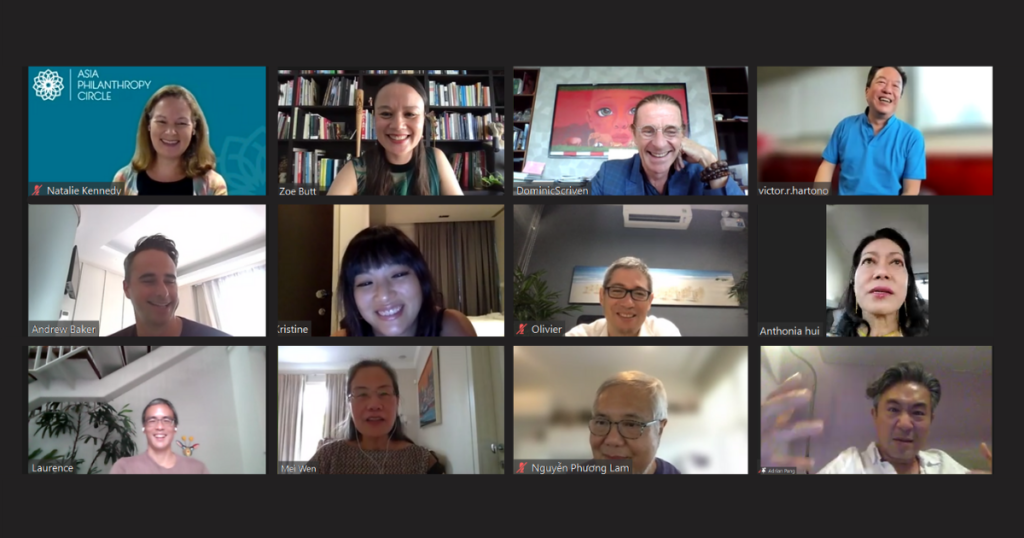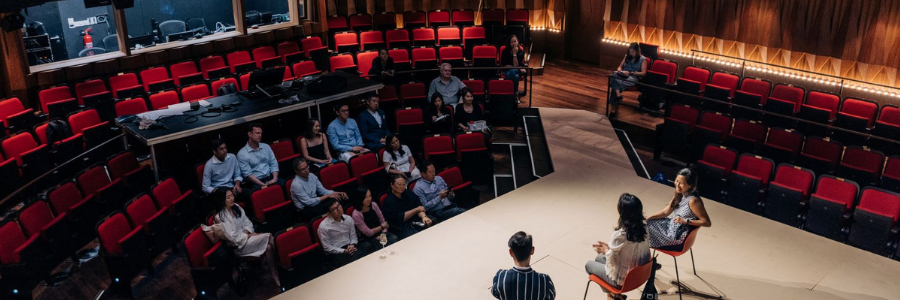by THERESA CUA
At the height of Singapore’s COVID-19 lockdown in 2020, The Sunday Times published a survey that shook the arts sector in the country. In a list of jobs deemed essential to keep Singapore going in times of crisis, respondents ranked artists #1…in the list of least essential jobs.
Yet—are they really? In this age of Netflix marathons, listening to music on Spotify, and browsing media content adorned with slick graphics on a mobile device meticulously crafted by product designers, can we really say that the very creative industries that have fuelled our survival-by-entertainment during the pandemic are truly ‘non-essential’?
Such is obviously not the case for APC members—many of whom support arts and culture, either personally or through their formal philanthropy, in one way or another. Gathering together for the first-ever APC Arts Salon, members talked about their own personal connections to the arts and the projects they passionately support—from restoration works at the Vatican, to archiving Vietnamese propaganda art, to equipping disadvantaged Indonesian youths with theatre skills, to harnessing art to examine sensitive issues in society. One thing was made clear throughout the course of discussion: that the arts do serve essential, if underappreciated, functions in society:
The arts uplift the soul.
The arts provoke and question the status quo.
The arts preserve history, identity, and build strong communities.
The arts can change mindsets and behaviour.
The arts help us connect with one another.
The arts provide livelihoods.

Opportunity in the Time of Pandemics
Beyond looking at the arts and its function in society, the Arts Salon also invited two guests to examine the effects of the pandemic on the sector, as well as the projects that have thrived, in spite of.
Adrian Pang, artistic director of Singapore theatre company Pangdemonium, shared how the pandemic has hit the theatre sector particularly hard. With the closure of performance venues and cancellation of all shows, actors found themselves out of work and forced to take on alternative jobs to stay afloat. And, while most businesses were able to successfully pivot to online operations, for Pangdemonium, going virtual was no substitute for live theatre.
The pandemic was however, not without some silver linings. This came in the form of The Pitch, a short film co-produced by three normally competing theatre companies: Pandemonium, Wild Rice, and the Singapore Repertory Theatre, featuring a humorous but sobering glimpse into the tribulations faced by the industry during the pandemic.
Such a collaboration would not have been possible in normal times, Adrian shares. The production helped raise funds to keep all three companies afloat and served not only to entertain audiences but also remind them (in between laughs), that perhaps, artists are not so unessential, after all. “The arts,” says Adrian, “are the heart and soul of the community.”
Also in Asia, Zoe Butt, who serves Artistic Director at the Factory Contemporary Arts Centre in Vietnam, shared how artistic collaborations across the region blossomed in 2020. Through The Factory’s PolliNation project, Zoe engaged two groups of artists from different countries, and found a common talking point to create a dialogue between communities and art associations—done mostly remotely while the COVID pandemic surged across the world. The artists and their works under PolliNation become a powerful tool for sparking dialogue to address social issues, often challenging others to discuss them openly—such as one artist working in the lower Mekong to examine the impact of dams on wildlife.
In Re-aligning the Cosmos, an exhibition in the works at The Factory, art is used as a tool to drive awareness on different subjects, such as the environment. In one such example, Zoe shares, an artist addresses the destructive and extractive processes used in the creation of precious stone art. The end product appears beautiful and clean, but the process required for production in small stone mines is anything but. Cosmos will bring the interconnectivity of life, planet, and humanity to the fore through art.
The Necessity of Art
Whether we look at the arts and its ability to uplift, preserve ideas, or drive social change—there’s one thing we can agree on: it’s that the arts are more necessary in our lives than we think, far from being unessential in times of crisis.
“The world needs artists more than ever to remind us what truth and beauty and kindness really are,” writes playwright Terence McNally, upon receiving his Tony Lifetime Achievement Award in 2019, a year before he died in 2020, tragically from COVID. We couldn’t agree more.

